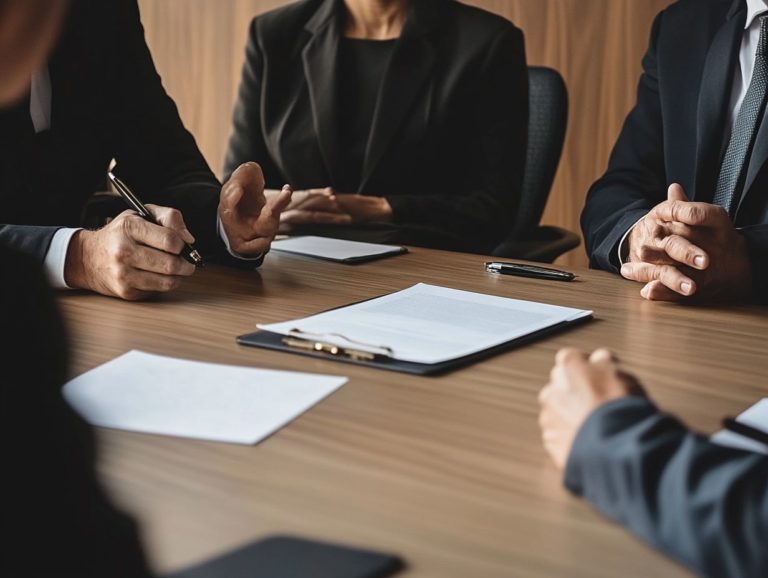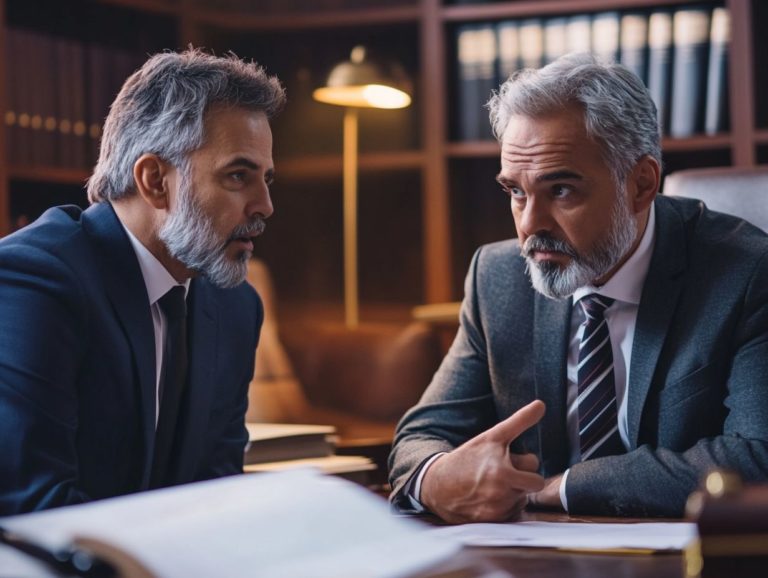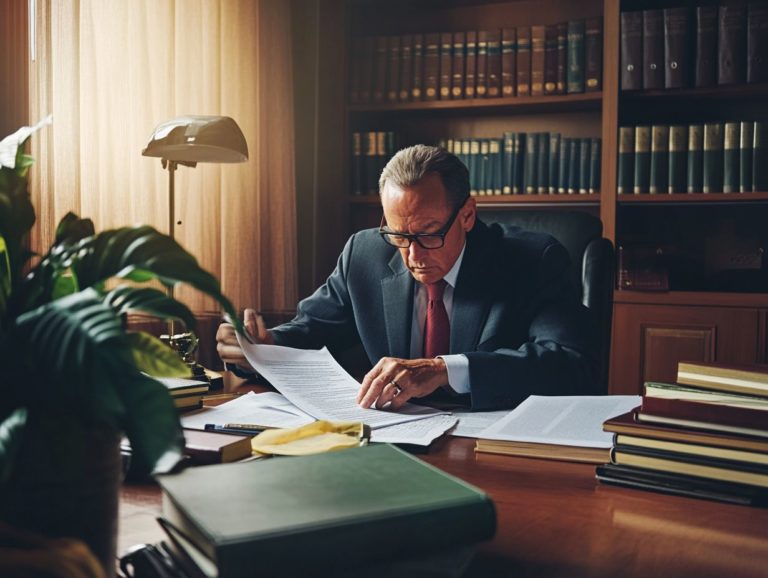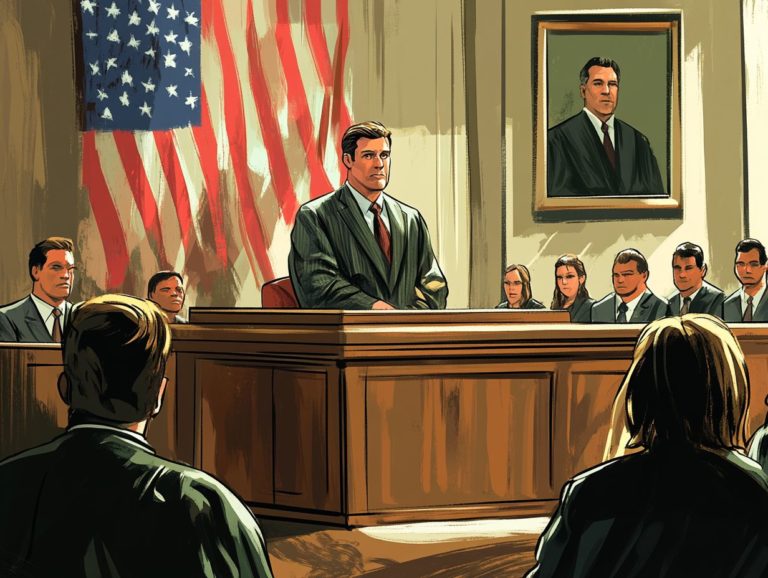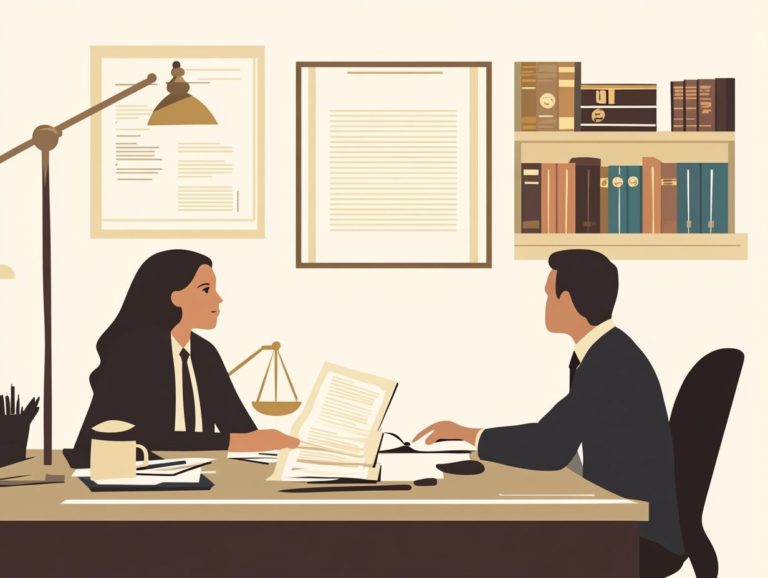Top Questions to Ask Your Defense Attorney
Selecting the right defense attorney is crucial when navigating the complex legal system. With so much on the line, it s essential to ask the right questions to find someone who aligns perfectly with your needs.
This guide outlines key questions to consider when interviewing potential defense attorneys, including their experience, the types of cases they handle, their communication styles, and more. By equipping yourself with this knowledge, you can make a well-informed decision and feel assured in your representation.
Contents
- Key Takeaways:
- 1. How Many Years of Experience Do You Have as a Defense Attorney?
- 2. What Types of Cases Do You Typically Handle?
- 3. How Do You Communicate with Your Clients?
- 5. What Is Your Success Rate in Defending Clients?
- 6. How Familiar Are You with the Local Court System and Judges?
- 7. What Is Your Approach to Building a Defense Strategy?
- 8. How Do You Handle Conflicts of Interest?
- 9. Will You Be Personally Handling My Case or Will It Be Handed Off to Another Lawyer?
- 10. How Do You Handle Confidential Information?
- 11. Can You Provide a Clear and Detailed Explanation of the Legal Process for My Case?
- 12. What Are the Potential Outcomes for My Case?
- 13. How Much Will Your Services Cost and What Is Your Payment Structure?
- 14. How Often Will You Provide Updates on My Case?
- 15. Are You Willing to Negotiate a Plea Deal If Necessary?
- Frequently Asked Questions
- What should I ask a defense attorney before hiring them?
- How do I know if a defense attorney is a good fit for my case?
- What is the difference between a public defender and a private defense attorney?
- How long will it take for my case to be resolved?
- What is the cost of hiring a defense attorney?
- Will my defense attorney keep my information confidential?
Key Takeaways:
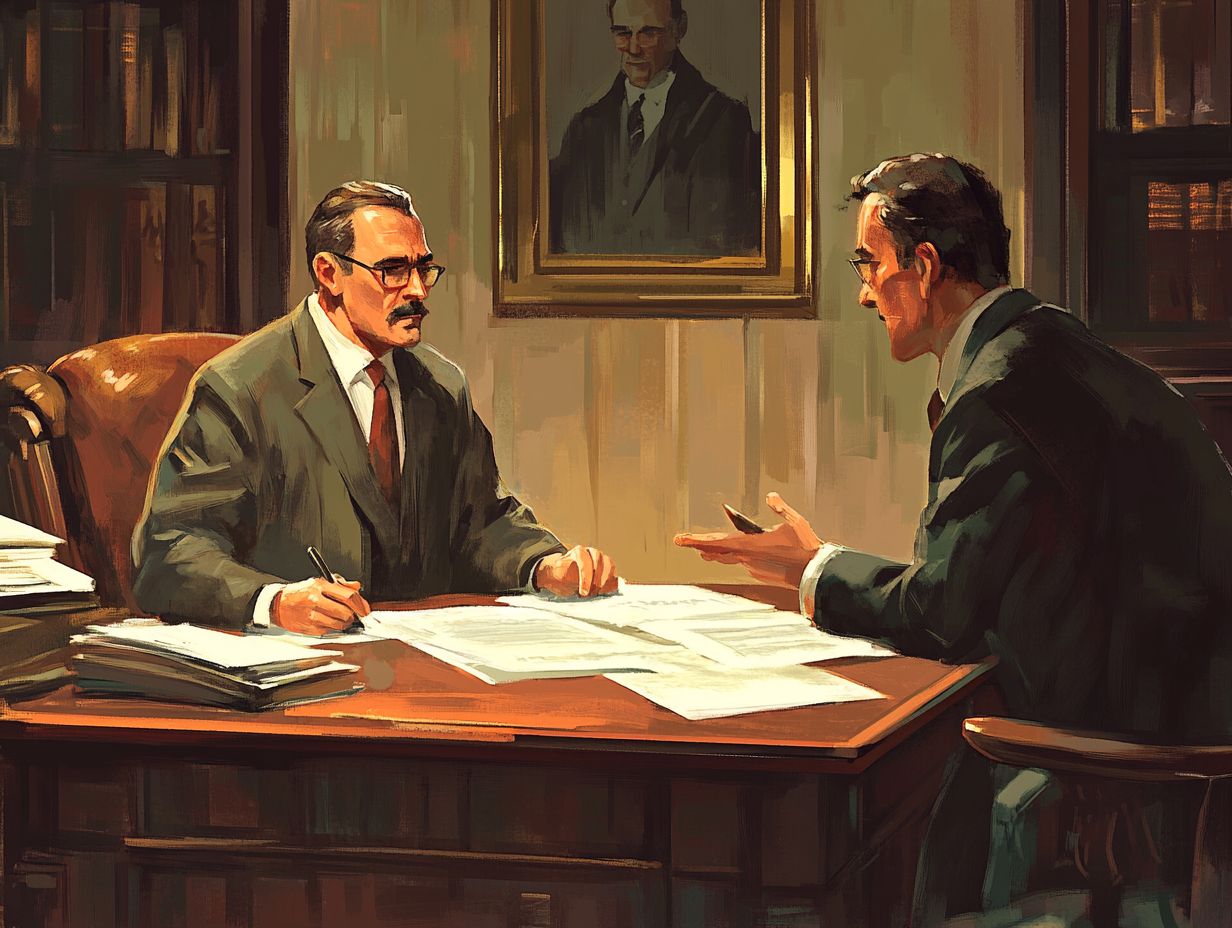
- Ask about their experience and success rate to gauge expertise.
- Inquire about their defense strategy and how they handle conflicts of interest.
- Understand potential outcomes, costs, and communication policies.
1. How Many Years of Experience Do You Have as a Defense Attorney?
When selecting a defense attorney, weighing their years of experience in criminal law is essential. This often directly influences the quality of legal representation and the attorney-client relationship.
An experienced lawyer, like Allan F. Friedman from Stamford, Connecticut, offers invaluable insights for navigating the complexities of the criminal justice system. They ensure that your defense plan is robust.
Experience with specific criminal offenses is crucial. It can genuinely be the line between conviction and acquittal. A seasoned attorney’s trial experiences give you a clearer picture of their ability to strategize effectively and manage courtroom dynamics, significantly enhancing your chances of securing a favorable verdict.
Consistent courtroom success acts as a testament to their skills, fostering your trust and satisfaction. A defense attorney well-versed in various scenarios will instill confidence, assuring you that your case is in capable hands and they have a proven track record of achieving results.
2. What Types of Cases Do You Typically Handle?
Different defense attorneys specialize in various types of criminal cases, including felonies and misdemeanors. These specializations directly influence their approach to criminal defense and legal representation.
These specializations enable attorneys to craft targeted strategies that address the nuances of specific offenses. For example, if you re facing drug-related charges, an attorney with expertise in that area will have a comprehensive understanding of the laws surrounding substance possession and distribution. This knowledge can dramatically change how your case is presented!
When seeking legal counsel, it s crucial to choose someone who understands not just the general legal landscape but also the intricacies related to your specific charges. This focused expertise can lead to more effective defense strategies, potentially enhancing the outcome of your case and ensuring that you receive a fair trial.
3. How Do You Communicate with Your Clients?
Effective communication is paramount in establishing a robust attorney-client relationship. Understanding how your lawyer communicates with you is essential for a transparent legal process.
Various communication methods play a critical role in this dynamic:
- Face-to-face meetings create opportunities for nuanced discussions, allowing you to express your concerns openly while fostering trust.
- Phone calls add a personal touch, enabling your attorney to address urgent questions swiftly.
- Emails serve as an efficient means to share documents or updates about your case, ensuring you remain informed at every step.
By addressing your inquiries promptly, your attorney enhances your satisfaction and makes you feel valued and actively engaged in your legal matters.
5. What Is Your Success Rate in Defending Clients?
An attorney’s success rate can indicate their effectiveness in legal representation. However, it is crucial to understand the context of these results; not all cases hold the same weight.
The types of cases an attorney handles, from misdemeanors to serious felonies, shape their experience and defense strategies. A strong track record against tough opponents shows an attorney’s skill in the courtroom.
Understanding these details gives potential clients insight into the solid legal defense they can expect.
6. How Familiar Are You with the Local Court System and Judges?
Familiarity with the local court system and judges is essential for any criminal defense attorney. It can significantly influence your legal representation and defense strategy.
When your attorney understands a judge’s tendencies, such as preferences for certain types of evidence, it allows for more tailored and effective trial preparation.
This understanding can lead to strategic adjustments in arguments or how evidence is presented, potentially swaying the judge’s perspective during proceedings.
Knowledge of local court procedures helps attorneys navigate the legal process efficiently, minimizing delays and ensuring compliance with specific requirements.
As a result, you benefit from a robust defense that is well-prepared and finely tuned to the unique dynamics of the courtroom, ultimately enhancing your chances of a favorable outcome.
7. What Is Your Approach to Building a Defense Strategy?

A well-thought-out defense strategy is essential when facing criminal charges, as it can significantly influence your case’s outcome. It all starts with a thorough case evaluation.
This initial assessment should consider all available evidence and potential defenses, ensuring that no critical facts slip through the cracks.
Legal advice is invaluable in this process; experienced attorneys provide insights that help you understand the complex legal process. By reviewing the steps taken during the investigation, you may uncover opportunities to challenge the prosecution’s case effectively.
It is also crucial to weigh any potential plea bargains carefully, as these might present an alternative path depending on your circumstances. Ultimately, customizing your strategy to the unique aspects of your case transforms a generic approach into one that could lead to favorable results.
8. How Do You Handle Conflicts of Interest?
Addressing conflicts of interest is vital to your ethical obligations as a defense attorney. It ensures that your legal representation remains unbiased and effective.
Your ability to identify and manage these conflicts is essential for maintaining your professional integrity and establishing trust with your clients.
Conflicts can arise in various situations, such as representing co-defendants or having prior relationships with opposing parties. In these cases, rigorous ethical standards dictate that you must transparently disclose any potential conflicts and, if necessary, withdraw from representation to safeguard your clients’ interests.
This commitment to transparency empowers your clients to make informed decisions about their legal representation, ultimately ensuring they receive the fair and impartial counsel they rightfully deserve.
9. Will You Be Personally Handling My Case or Will It Be Handed Off to Another Lawyer?
It’s crucial to understand whether your lawyer will personally handle your case or pass it off to someone else. A consistent lawyer who comprehends your unique situation can significantly impact the outcome.
A lawyer experienced in your specific case type offers tailored strategies and builds the trust necessary for navigating complex legal systems.
If your case is handed to less experienced lawyers, key details might get overlooked, which could jeopardize your case.
Personalized guidance from a knowledgeable lawyer often leads to better strategies, stronger advocacy, and more favorable outcomes in court.
10. How Do You Handle Confidential Information?
Safeguarding confidential information is essential for maintaining a strong attorney-client relationship and protecting your legal rights. Lawyers follow strict protocols to keep your sensitive information secure.
This includes robust data protection measures like encryption, secure file storage, and staff training on confidentiality. Breaches can have serious consequences, including disciplinary actions and lawsuits.
Such incidents can erode your trust and complicate your lawyer s ability to advocate effectively for you. Therefore, strict adherence to confidentiality protocols is both a legal requirement and essential for building trust.
11. Can You Provide a Clear and Detailed Explanation of the Legal Process for My Case?
Clear explanations of the legal process are vital for your understanding and confidence in your representation. This transparency helps demystify confusing legal jargon and allows you to engage actively in your defense.
Lawyers typically begin with a thorough investigation, collecting evidence and witness testimonies to build the case. After these steps, the focus shifts to courtroom procedures, where strategic arguments are developed.
Many lawyers will discuss potential plea deals when appropriate, empowering you to make informed decisions and fostering a strong attorney-client relationship key for navigating the complexities of criminal law.
12. What Are the Potential Outcomes for My Case?
Knowing the potential outcomes of your case empowers you to make informed choices about your legal representation and any plea bargain options.
This knowledge enables you to navigate the legal process with confidence.
The decision to go to trial or accept a plea deal depends on several factors:
- The evaluation of evidence by your legal team
- The strength of your defense strategy
The perceived risks and benefits of each option can significantly influence your decision. Don’t overlook the possibility of dismissal due to insufficient evidence or procedural issues, which can add another layer to your overall legal strategy.
13. How Much Will Your Services Cost and What Is Your Payment Structure?
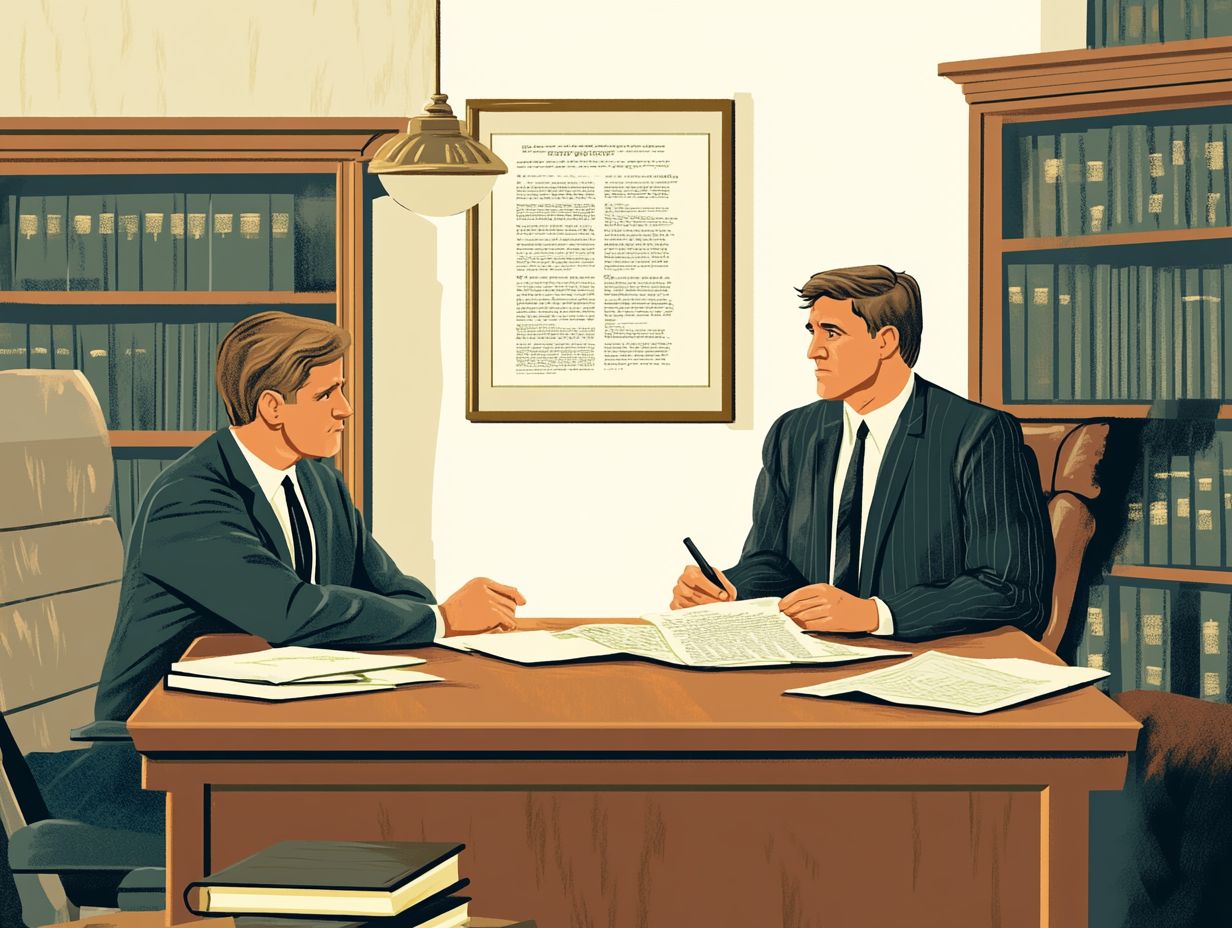
Understanding the costs that come with hiring a criminal defense attorney is essential. You ll want to consider legal fees, payment plans, and whether a fixed fee structure is an option.
Different fee structures can significantly influence your overall financial burden. Some attorneys charge by the hour, while others may offer flat fees for specific services. Hourly rates can vary widely based on the attorney s experience and the complexity of your case. Therefore, it s vital to ask about the expected time commitment upfront.
Fixed fees can provide you with a clearer understanding of your costs, allowing you to avoid any surprise expenses. Transparency in fee quotations is crucial for building trust; you should always feel comfortable inquiring about potential additional charges.
Flexible payment plans can also help ease financial stress, enabling you to manage your legal costs with greater ease.
14. How Often Will You Provide Updates on My Case?
Regular communication about your case progress is vital for your satisfaction and peace of mind, making it essential to understand how frequently your attorney will provide updates. This practice ensures you feel engaged and valued throughout the legal journey.
When attorneys take the time to answer your questions promptly and thoroughly, they foster a sense of trust. This trust makes it easier for you to discuss any concerns you may have. Receiving timely updates can significantly alleviate anxiety, keeping you informed and aligned with the strategy being pursued, which may involve fines, jail time, or other legal repercussions.
Ultimately, effective communication is the foundation of a strong attorney-client relationship, enhancing your overall experience and satisfaction with the legal services provided.
15. Are You Willing to Negotiate a Plea Deal If Necessary?
The willingness to negotiate a plea deal is an important part of your attorney’s plan, showcasing their dedication to securing the best possible outcome for you.
Such negotiations become especially crucial when the evidence against you is overwhelming or when the potential consequences of a trial could result in significant penalties. In these scenarios, your attorney may shift from a combative trial strategy to a more pragmatic approach, exploring plea options designed to minimize risks.
Engaging in this process is essential for you; your insights can directly guide your attorney s strategy for the best outcome. Maintaining open communication ensures that every facet of your case is understood, facilitating a customized approach that takes both legal ramifications and your personal circumstances into account.
How Can I Help with My Own Defense?
You can take an active role in your defense by providing valuable information to your attorney and asking pertinent questions that shape your defense strategy.
By sharing relevant evidence or insights into your personal circumstances, you enable your attorney to build a more robust case. This collaboration is crucial; the more details your attorney has, the better they can navigate the complexities of the legal system.
Maintaining open lines of communication fosters a trusting relationship, allowing you to express concerns, clarify misunderstandings, and suggest strategies that might resonate with your case.
When you engage actively, you not only help your attorney understand your unique situation but also feel more invested in the outcome, which can lead to a stronger defense.
What Factors Should I Consider When Choosing a Defense Attorney?
When selecting a defense attorney, you should consider several key factors, such as their experience in criminal law, communication style, and reputation for client satisfaction.
It s essential for you to evaluate not just the attorney s years of practice but also their track record with cases similar to yours, as this can provide valuable insight into their success rates. Assessing fee structures is equally important; ensure you fully understand the billing process whether it s a flat fee or hourly rate so you can avoid any unexpected financial surprises.
Reading client testimonials can give you a glimpse into the attorney s approach and effectiveness. Ultimately, finding a lawyer with whom you feel comfortable discussing sensitive matters can significantly enhance your overall experience and outcomes during what can be a challenging time.
Take the next step and discuss these points with your attorney today!
What Should I Do if I Am Not Satisfied with My Current Defense Attorney?
If you’re not satisfied with your current defense attorney, it’s essential to take a step back and assess why that is. Consider seeking a consultation for alternative legal representation.
Start by initiating an open dialogue with your attorney to address any specific concerns or unmet expectations. By clearly communicating your grievances, you might find that some issues can be resolved through constructive feedback.
If your dissatisfaction lingers, seek a second opinion from another legal professional. This can provide clarity and possibly reveal options you hadn t previously considered.
Ultimately, prioritize your comfort and confidence in your legal representation. A trusting relationship is vital for handling legal issues effectively.
How Can I Prepare for My First Meeting with a Defense Attorney?

Preparing for your first meeting with a defense attorney can significantly enhance the effectiveness of your consultation and provide you with a clearer case evaluation.
To ensure a productive discussion, gather relevant documentation such as police reports, witness statements, and any correspondence related to your case. This foundational information allows the attorney to comprehend the specifics and nuances that may influence your legal strategy.
Formulate questions to ask, like those regarding potential defenses, possible outcomes, and timelines. This can enable you to feel more informed and engaged in the process.
Being open and honest about all aspects of your case fosters trust and cultivates a collaborative environment, enabling both you and the attorney to work towards the best possible resolution.
Frequently Asked Questions
-
What should I ask a defense attorney before hiring them?
-
How do I know if a defense attorney is a good fit for my case?
-
What is the difference between a public defender and a private defense attorney?
-
How long will it take for my case to be resolved?
-
What is the cost of hiring a defense attorney?
-
Will my defense attorney keep my information confidential?
It is important to ask a defense attorney about their experience handling cases similar to yours, their success rate, and their approach to defending clients. You should also ask about their fees and if they offer a free consultation.
Look for a defense attorney who has experience and success in handling cases similar to yours. It is also important to feel comfortable and have good communication with your attorney, as they will be representing you in court.
A public defender is provided by the government for individuals who cannot afford to hire a private defense attorney. Private defense attorneys are hired by individuals and can often provide more personalized attention and resources to your case.
The length of time it takes to resolve a case varies depending on the nature of the charges and the complexity of the case. Your defense attorney should be able to give you an estimate based on their experience and the specifics of your case.
The cost of hiring a defense attorney varies depending on the attorney’s experience, location, and the complexity of your case. It is important to discuss fees and payment options with your attorney before hiring them.
Yes, defense attorneys are bound by attorney-client privilege and are required to keep all information shared between them and their clients confidential. This ensures that you can trust your defense attorney with sensitive information related to your case.

